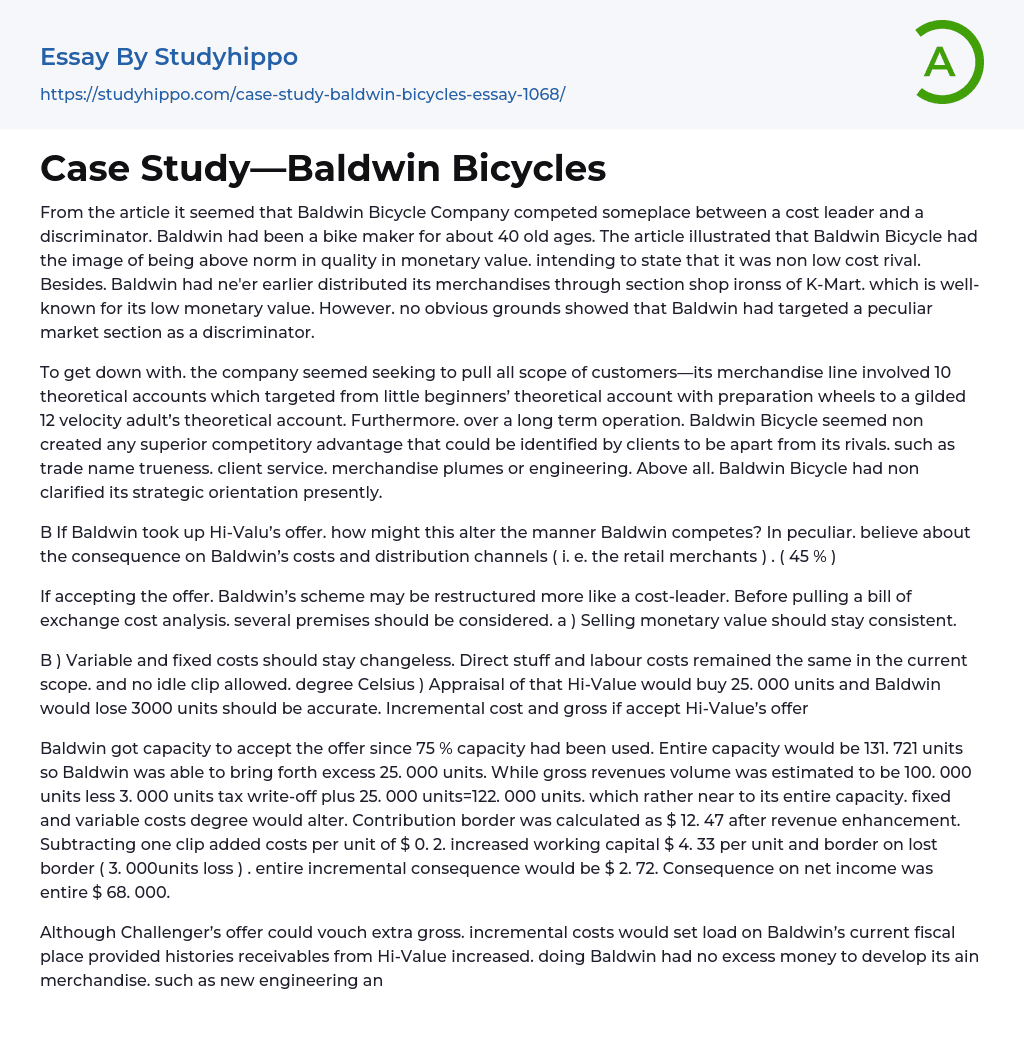
The Baldwin Bicycle Company has been in the bicycle production business for nearly four decades and is considered to be positioned somewhere between a cost leader and discriminator. Although known for producing above-average quality bicycles, Baldwin does not have a reputation for low-cost pricing or sales through retail chains such as K-Mart. However, with its 10-model line catering to both novice and experienced riders, it appears that Baldwin is targeting a broad range of customers. Despite being in the industry for an extended period, Baldwin has not established any discernible competitive advantages over competitors regarding brand loyalty, customer service, product innovation or superior technology. If Hi-Valu's offer is accepted, Baldwin may shift towards becoming more of a cost-leader which could significantly impact the company's costs and distribution channels.
When analyzing the bill of exchange's cos
...t structure, it's vital to consider several premises such as consistent selling monetary value along with fixed and variable costs remaining unchanged. It is essential to maintain consistency in direct materials and labor expenses without allowing any idle time allowance. Additionally, a comprehensive evaluation into Hi-Value's intention to buy 25K units as well as potential losses by Baldwin of around 3K units should be undertaken. As Baldwin has already utilized 75% of its total capacity; accepting this offer seems possible since they can produce up to 131,721 units maximum capacity inclusive of another 25K units proposed by Hi-Value purchase order.Sales volume is expected to increase from 100,000 units to 122,000 units by subtracting tax write-offs on 3,000 units and adding an extra 25,000 units. However, changes in fixed and variable costs need to be considered. After deducting taxation from the contribution margi
of $12.47 per unit and factoring in one-time added costs of $0.2 per unit, increased working capital worth $4.33 per unit, and lost margins on the sale of 3,000 lessened; there will be a net incremental effect totaling $2.72 resulting in an overall impact on net income amounting up to $68k.
Accepting Challenger's offer would generate additional revenue for Baldwin but could place financial pressure if receivables escalate with little room for investment towards new technology or rewards. Although Baldwin's current distribution channel only reaches specialty bike stores, accepting this offer means expanding reach by selling at Hi-value shops at lower prices compared with well-known bike brands like Trek.
However, accepting Hi-Value's offer to sell Baldwin's bikes at a lower price could potentially damage the company's brand image as a high-quality and high-priced bike maker leading to loss of customers and revenue while competitors may follow suit or seek new partnerships with similar retailers.Furthermore, Baldwin's projected revenues could be affected if Hi-Value decides to terminate the contract after three years for a cheaper option. This offer also presents long-term implications on Baldwin's brand image as other manufacturers may introduce new technology or add new features to differentiate themselves as top products. It is important to consider factors such as break-even point and safety margin, especially in light of poor economic conditions that brought the break-even point closer and potential revenue losses. To avoid risk of net income loss instead of profit, Baldwin should accept Hi-Value's offer while also considering cash flow and warehouse space requirements since increased production would incur further costs. Additionally, high purchase levels would continue if financed by a loan given the current debt
equity ratio and predominance of short-term loans. Therefore, before making any decision, Baldwin needs to define its strategy and assess the impact carefully. According to Miles and Snow typology, strategically speaking,Baldwin resembled more of a reactor than guardian thus requiring careful evaluation before accepting any offers since it is considered a non-innovative company that maintains its current market and product line rather than being highly innovative like explorers should be.Baldwin may have been classified as a reactor according to Mile and Snow's typology. This was likely due to Baldwin's lack of clear strategy under top direction, which resulted in only responding to macro environmental pressures like the poor economy. A reactor organization is characterized by management that does not fully establish organizational structure or processes suited for a chosen strategy, lacks focus on securing the current market with limited products or quality customer service like a defender strategy would, and maintains their current strategy-structure relationship despite overwhelming changes in environmental conditions such as the risk of losing sales or Hi-Value's offer.
- Money essays
- Financial Accounting essays
- Market Segmentation essays
- Supply And Demand essays
- Purchasing essays
- Forecasting essays
- Legacy essays
- Bank essays
- Corporate Finance essays
- Financial News essays
- Financial Ratios essays
- Financial Services essays
- Free Market essays
- Shareholder essays
- Personal finance essays
- Equity essays
- Financial Crisis essays
- Banking essays
- Credit Card essays
- Currency essays
- Debt essays
- Gold essays
- Loan essays
- Enron Scandal essays
- Foreign Exchange Market essays
- Investment essays
- Venture Capital essays
- Stock Market essays
- Retirement essays
- Donation essays
- Net Present Value essays
- Income Statement essays
- Commercial Bank essays
- Debit Card essays
- Deposit Account essays
- Subprime Lending essays
- Perfect Competition essays
- Underwriting essays
- Synergy essays
- Valuation essays
- Investing essays
- Asset essays
- Depreciation essays
- Discounted Cash Flow essays
- Foreign Direct Investment essays
- Funds essays
- Internal Rate Of Return essays
- Revenue essays
- Day Trading essays
- Futures Trading essays



